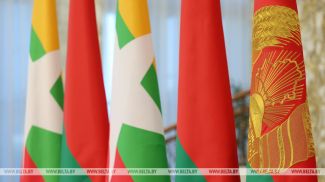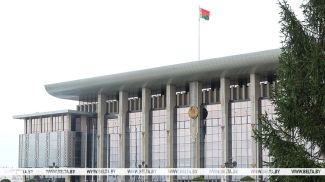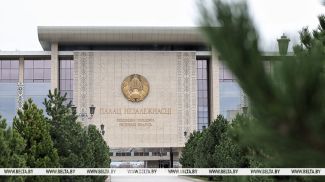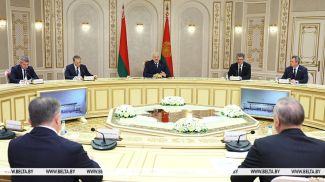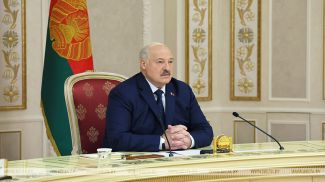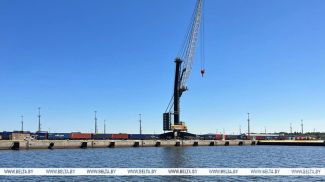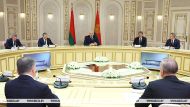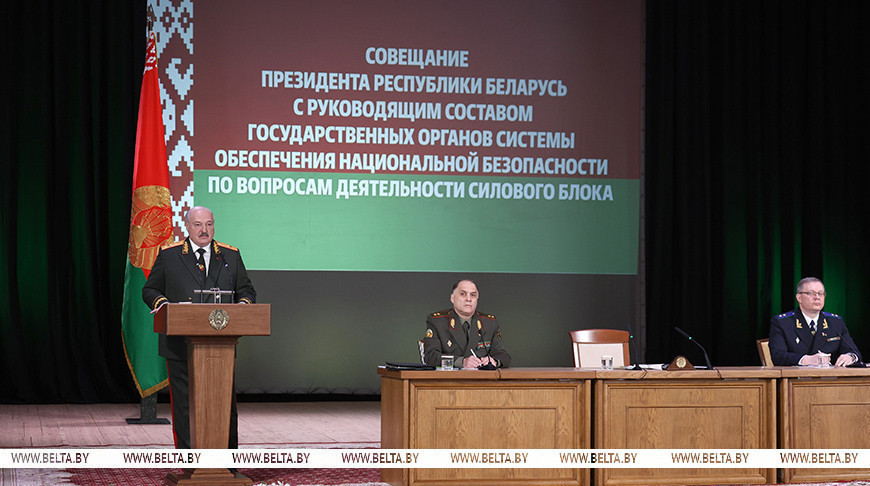
MINSK, 20 February (BelTA) – Belarus must be 100% prepared to neutralize risks and threats, Belarusian President Aleksandr Lukashenko said at a large meeting with the senior staff of the national security agencies in Minsk on 20 February, BelTA has learned.
“We must be prepared as much as possible to neutralize risks and threats. For this, it is necessary to address priority tasks,” the head of state said and went on to discuss each of these tasks in detail.
Task No. 1 Increasing Belarus’ defense capacity
“Zero in on systemic measures to boost the country’s defense capacity and maintain the combat capabilities of all elements of the state’s defense system,” Aleksandr Lukashenko said formulating the first task.
The president noted that military units and units of the State Border Committee and the Armed Forces efficiently protect the southern and western border of the country. “Of course, the military personnel’s moral readiness to defend the Motherland is of great importance. I know that everything is fine with this, even more than fine (in the ranks of the Armed Forces; I will not say about society as a whole). There are hot heads that are eager to go into battle even tomorrow,” the head of state said.
“And if you look at the situation in Belarus, you will see that we have been fighting a hybrid war for a long time, and I have said it more than once,” Aleksandr Lukashenko continued. “And we are doing everything to prevail without engaging in a battle. Therefore, we are building the combat capabilities of our army.”
In order to strengthen defense capabilities, changes were made to the training of law enforcement, military and security personnel taking into account the specifics of waging modern wars, the president remarked. “The joint drills with units of the Russian Armed Forces (and we saw that we were no worse than them), PMC Wagner produced results,” said the head of state. The real combat experience studied during the drills must be promptly introduced into the daily training routine of all military personnel, especially special forces, the head of state demanded.
The president emphasized that Belarus is strengthening its armaments capabilities. The military keep getting new models of hardware. The latest models of the Belarusian MLRS Polonez-M with a firing range of up to 300 km have been put into operation. Two S-400 anti-aircraft missile battalions and two battalions of Iskander-M missile systems have entered service. Tactical nuclear weapons are stationed on the country’s territory. “Today this is the most important element of deterring any enemy,” Aleksandr Lukashenko noted.
“We have everything in place to defend ourselves and, as the military say, to inflict unacceptable damage on the enemy. This is the essence of our strategy,” the head of state emphasized.
Checks of combat and mobilization readiness of troops, carried out upon the instruction of the president, showed that the troops are capable of fulfilling their tasks. “We will continue giving priority attention to this issue,” assured Aleksandr Lukashenko. He went on saying: “For the first time in the country’s history, we have mobilized an entire mechanized brigade [the 11th separate mechanized brigade of the Western Operational Command]. We have also conducted a number of inspections of units of the rapid response forces while simulating a scenario of conflict escalation.”
“I have been told that they were up to the task by and large,” said the head of state. “At the same time, shortcomings were identified in the military personnel training, first of all, in the professional training of officers.” There are problems, in particular, with keeping equipment and weapons in good condition, maintaining stocks of missiles, ammunition and other materiel. Problems were identified in the planning, in the use of rapid response forces and in carrying out air defense combat duty.
“I have been informed that work is currently underway to eliminate these shortcomings,” the president said. He expects to receive more detailed information about existing drawbacks in the security system from State Secretary of the Security Council Aleksandr Volfovich.
“When we see such shortcomings, we have to repeat the simple truths. For people in uniform, formalism and sloppiness are absolutely unacceptable,” Aleksandr Lukashenko emphasized. “There must be iron discipline and the highest level of professionalism.” And there are issues with this too, he noted.
“All our efforts are doomed to fail without dedication to service, without understanding that we are at the tipping point. No cutting-edge weapons and technologies will help. Personnel must come first,” the president said. According to him, the work with personnel should focus on the morale and spirit of each officer, because the mood of soldiers largely depends on this.
“The task for the Defense Ministry for the coming year is to carry out substantial transformation of the army and improve the country’s defense system. We must give priority to the combat training of military units and subunits. Moreover, 2024 is the Year of Field Training for the Armed Forces,” the head of state emphasized.
The president noted that everyone who is involved in maintaining national security or will be called up for service must clearly understand how to act and what tasks to perform. This applies to everyone, including territorial defense and people’s militia.
When creating these formations - territorial defense and people’s militia, serious legislative work has been done in Belarus. “All legislative issues have been settled,” the president stated.
“Yet, everyone understands that laws alone are not enough to achieve the goal,” he continued. “The system of training and running people’s militia should work like a clock. It is necessary to take into account the available experience. The Ukrainian scenario, when weapons were distributed among the population without any oversight, is unacceptable for us. In principle, we should learn from the situation in Ukraine as we keep improving artillery training, honing skills in counter-battery warfare, and upgrading electronic reconnaissance equipment,” the head of state said.
“And let’s be honest: we are already behind when it comes to unmanned aircraft and kamikaze drones and the provision of a large amount of this equipment to the army, as well as training of drone operators. This should have been done yesterday. Therefore, it is necessary to catch up. This is the task not only for the Defense Ministry, but also for the Ministry of Internal Affairs, the State Border Committee. The Security Council needs to take this issue under control and continue checking the quality of training of law enforcement, military and security personnel this year,” the president said.
Task No. 2. Safeguarding the border
Aleksandr Lukashenko called the security and impregnability of the country’s border the second most important task.
Not only border guards, but also other agencies are involved in protecting the border. “This is a symmetrical response to the build-up of border infrastructure by the neighboring countries, the technical capabilities of which go far beyond the declared goals. The reasons for it as well as threats have already been discussed. We have an unequivocal stance against all the related provocations, including the illegal pushing of refugees from the territories of Poland, Lithuania and Latvia to Belarus (throwing them across the border, sometimes dumping dead bodies), the closure of a number of checkpoints, restrictions on the transit of goods. And we respond to this,” the president noted.
At the same time, the question of what they are up to on the other side of the border is not the main one now. “It is much more important to understand whether we are ready to be one step ahead in any scenario planned for us. This is a matter of national security, the protection of our national interests. And it all starts from the border. Oversleeping any signal or provocation will be disastrous for us. We have approved security decisions on safeguarding the state border. I demand their strict implementation,” said Aleksandr Lukashenko.
Taking into account the unprecedented close proximity of the NATO military contingent and the large-scale exercise of the Alliance, it is important that the Belarusian border service and the Armed Forces interact in the closest way possible, the head of state said. He gave an instruction to involve other agencies if necessary.
Task No.3. Responding to acts of terrorism
The third task set by the head of state is to increase the effectiveness of the state system for responding to acts of terrorism by terrorist organizations and illegal armed groups.
"The inspections carried out on my instruction showed that the KGB, as a coordinator, is generally prepared to organize the work of defense, security and law enforcement in the event of militants penetrating our country or a terrorist act. But at the tactical level, the coherence of the actions of the units is still far from perfect," the president said.
At the same time, the motivation and readiness of the special units to carry out tasks to prevent acts of terrorism is high. But everyone, not only special units, should be professionally trained, the head of state emphasized. He urged to refine the algorithms of actions by the national terrorism and extremism response system, to continue combat coordination and high-quality combat training of all parties.
"Our self-exiled opposition and their handlers from the special services are looking for people to recruit for terrorist attacks and sabotage acts. There were enough cases. It is good that the terrorists have been identified and detained. But the question arises: if our border is locked, how were these militants able to deliver weapons and organize weapon caches?” the president asked. "The issue requires a detailed analysis to prevent such cases in the future."
The head of state noted that he had given an instruction to check how the facilities of the Defense Ministry, the State Border Committee, the KGB, the Ministry of Internal Affairs, civilian critical infrastructure are protected. "The anti-sabotage system has been created to ensure the protection of these facilities," Aleksandr Lukashenko said.
According to him, countering drone flights over protected areas remains important. "Personnel should be trained to repel such attacks with the use of small arms, means of suppression, to search and detain operators," the president said.
The head of state set the task for the State Security Committee to continue improving the anti-terrorism response system. "Everything should work like a clock. It is important to practice all actions until they are second nature," Aleksandr Lukashenko stressed.
Task No.4 Cybersecurity
Ensuring the country’s cybersecurity at the highest level is the fourth task outlined by the head of state. "Cyberattacks are the main threat to the modern digital society," the president said, noting that Belarus has done a lot to protect the critical information infrastructure data. Thus, the relevant decree (on cybersecurity) enshrines the main areas of action to build the national cybersecurity system.
A special unit of the Operations and Analysis Center has conducted a training session with the national security forces of Belarus for the first time this year. “I am waiting for a report on the results,” Aleksandr Lukashenko said. “We can already say that there are issues that need to be addressed.” Despite the measures taken, attempts to hack state media outlets continue.
“Methods are constantly improving. No security system can guarantee absolute protection from cyberattacks. We must minimize the risks,” the head of state said, expressing confidence that everyone understands that state media outlets and information systems must continue stable operation.
Task No.5. Safety of people
The president set the fifth task for all law enforcement agencies, first of all the Ministry of Internal Affairs and the Emergencies Ministry: “People should feel safe at home, at work, on the street at any time of the day.”
The crime rate in Belarus is decreasing. According to Aleksandr Lukashenko, the law enforcers’ performance is satisfactory in general. The number of grave crimes and less serious felonies has decreased.
There are however some negative trends, the president added. The number of frauds, extortions and cybercrimes is on the rise. Here, reports should not leave behind unresolved issues and broken lives of people. The head of state has already given corresponding instructions to improve the norms of criminal legislation. “We need to carry out this work promptly,” he instructed.
“I have been briefed that additional measures have been taken to promptly investigate extremist crimes. Today this is the most important aspect of maintaining law and order, suppressing unlawful actions of those who do not yet fully understand what their foreign handlers are aiming at,” the president said.
In his words, the crime rate is a kind of a manifestation of the community’s problems (both overt and covert), an indicator of real challenges and threats to national security. “Detecting and suppressing them is not enough. There must be good communication between all elements of the fight against illegal acts and society,” he said. “It is absolutely unacceptable for law enforcement officers to violate the law as well.”
The president asked the prosecutor general to report on the state of law and order, first of all, in the activities of the national security agencies.
The head of state also emphasized a decrease in the number of fires and the number of people killed in them. “We however should strive for zero figures here,” Aleksandr Lukashenko said. “Children also perish, which requires fundamental measures to prevent such tragedies.” According to the president, accountability of those responsible should be strengthened.
The head of state also mentioned unresolved issues with equipping dormitories and facilities designed to accommodate a big number of people with automatic fire alarm and fire warning systems. “Is it a problem? Or unwillingness?” the president asked. "But please do not go too far not to bring the economy to a halt tomorrow. Because we know that the Emergencies Ministry gets carried away sometimes."




